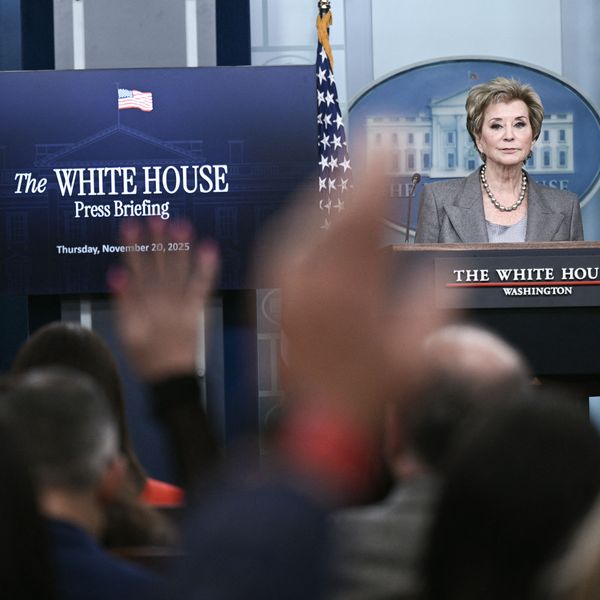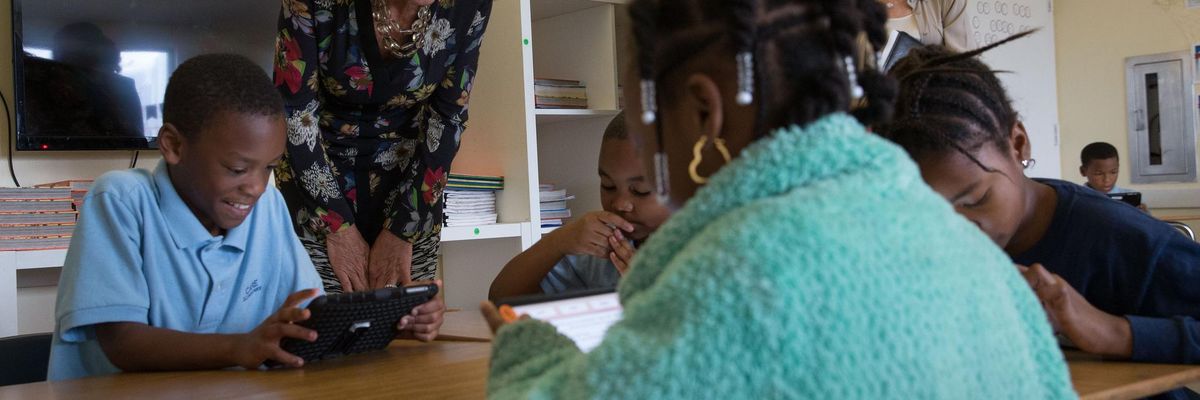While the vast majority of American parents are addressing Back to School season by buying supplies, readying their children, and joining with other families in preparing for a hopefully successful new year, U.S. Secretary of Education Betsy DeVos is traveling cross-country in a bus to spread a very different message completely at odds with the hope, anticipation, and resolve parents and their communities feel about public education.
Just how far at odds DeVos's views about public education are with the average American parent's views became apparent in a new survey released during her bus tour.
DeVos, who says she fully supports "great public schools," christened her bus tour with the theme "Rethinking Schools" which somewhat assumes there's something wrong with public schools to begin with. Her stated purpose for the tour is to promote "innovation" in our education system, which seems fine itself.
But in the first stop of the tour in Wyoming, DeVos's strongest comments were aimed at the the negative message she's been spreading about public schools ever since she was nominated.
As education journalist Valerie Strauss reports on her at the Washington Post, DeVos's remarks to an audience of public school school children were anything but an upbeat message. Instead of raising their hopes for the year, she said "most students" are starting the new year at schools that are "a mundane malaise that dampens dreams, dims horizons, and denies futures."
She contrasted an idealized version of the pioneering spirit that settled the West to the "education system" she rejects--"There's no such thing," she said - despite the historic role of public schools in settling the West.
In Colorado, DeVos visited a private school known for specializing in educating children with autism. As a state based media outlet reports, DeVos's tour chose the school because of its "role in the landmark Supreme Court case" that led to raising the standard schools must meet to educate students with disabilities.
"During her comments," the reporter writes, "DeVos did criticize 'artificial barriers schools create to meet the needs of students.' She did not identify those barriers."
A barrier DeVos could have identified is the fact that the federal government has never lived up to its legal obligation to fully fund the Individuals with Disabilities Education Act. While Congress authorized the federal government to pay 40 percent of each state's obligations to educate children with disabilities, current levels of federal spending are less than half that. And the budget President Trump and DeVos have proposed in no way addresses for this chronic shortfall.
Then in Nebraska, DeVos chose to visit more private schools--one supported by a local wealthy foundation, and the other a Catholic school--which seems to suggest her notion of rethinking schools is to reconceive them as private schools.
While DeVos's bus tour paints a bleak and failing portrait of our nation's public schools, a new survey reveals that parents' attitudes toward public education are very different
As Education Week reports, the national poll, conducted by Hart Research Associates, finds, "Most parents like their public school and want to support teachers, whom they trust more than anyone else to make choices for education." The survey was conducted for the American Federation of Teachers, the nation's second largest teachers' union.
Contrasting to DeVos's message about public schools as being "a mundane malaise," 73 percent of parents responding to the poll "said their public school was 'excellent or good,' 20 percent said it was 'adequate,' and just 7 percent said their public school was 'not so good or poor.'"
In contrast to DeVos's promoting more expansions of private schools and charter schools, the poll found, "Over 70 percent of parents said they would prefer a good quality neighborhood public school for their children over the ability to have more choice of what schools they can send their children to."
In contrast to DeVos's proposals to keep our schools inadequately funded, "most parents" responding to the survey "disapprove of reducing spending on traditional public schools and using the funds to increase spending on charter schools."
Given the results of the survey, there's little surprise members of Congress are not exactly rallying around the DeVos agenda for public education. Even Republicans on Capitol Hill are generally rejecting most of her budget cuts and her plans to send more public funding to private schools. Yet, at the same time, Congress seems to have no plans to enact the stronger support for neighborhood public schools parents prefer.
What's not at all clear is where we go now from this place where we have a presidential administration horribly out of step with the people, a population which seems fairly unified on its priorities, and a Congress in a "mundane malaise" about the conflicted agenda.



